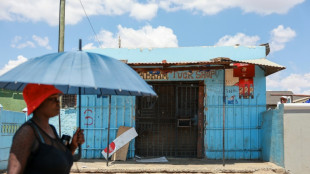

Czechs start razing pig farm built over WWII Roma camp
The demolition of a sprawling pig farm, built on the site of a wartime concentration camp for the Roma minority south of Prague, got underway on Friday following decades of controversy.
Targeted by the Nazis, some 1,300 Roma were imprisoned in the Lety camp during World War II, and 327 died there, including 241 children under 14 years of age.
More than 500 others were sent on to Nazi Germany's infamous Auschwitz-Birkenau death camp in occupied southern Poland.
The Moscow-steered communist regime, which ruled in former Czechoslovakia after the war, built the pig farm on the site in the 1970s.
The regime was toppled in 1989, four years before Czechoslovakia split into two states.
But even then successive Czech governments took decades to finally allow the demolition as the largely impoverished Roma minority stayed on the sidelines of society.
"Today marks the beginning of the end of one of the most shameful chapters in our modern history," parliament speaker Marketa Pekarova Adamova said at a ceremony in Lety.
Together with other officials, she symbolically started the demolition by dismantling a model made of little concrete bricks.
Cenek Ruzicka, whose mother was a Lety survivor, was less restrained as he grabbed a pickaxe and started smashing one of the buildings of the farm that was once home to 13,000 pigs.
His brother had a go at the windows with a hammer.
"As you can see, it has ended well. Of course I didn't expect it to take so long," Ruzicka told AFP.
- 'My culture drove me' -
Late Czech president Vaclav Havel unveiled a memorial near the farm in 1995, but officials then tiptoed about the farm which had been taken over by a private company.
A breakthrough came only in 2018 when the government agreed to buy the farm and build a Roma Holocaust memorial on the site, under pressure from the Roma minority and international institutions including the United Nations and the EU.
A visitor centre is due to be completed early next year as the first part of the memorial whose total construction cost is expected to be more than 100 million Czech koruna ($4 million).
Ruzicka, whose grandmother and three-month-old sister died at the camp, was a major driving force behind the move.
"My culture drove me. The guys from our community of the original Czech Roma are terribly proud, we never give up," said Ruzicka, who was born in 1946.
The Czech Republic, an EU country of 10.5 million people, has a Roma community estimated to number between 250,000 and 300,000.
Of the 9,500 Czech Roma registered before World War II, fewer than 600 returned home after the Holocaust.
Historians believe the Nazis exterminated over half of the roughly one million Roma who had lived in Europe prior to World War II.
The European Union estimates that 10-12 million Roma currently live in Europe, around six million of them in EU nations.
Y.Ingvar--MP



